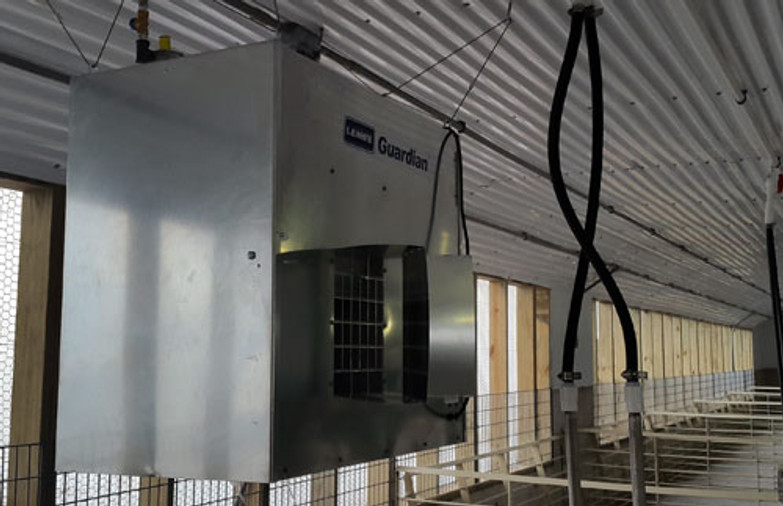Preparing Your Barn For Winter: 5 Tips To Prep Your Barn Heaters
Oct 18, 2021
Preparing your barn heaters for the winter season is important for the health and safety of your livestock. Whether you have a small facility with only a few heads of cattle, or you operate a large-scale, commercial farm, be sure you have a thorough understanding of the heating needs of your animals. While preparation might be tedious, prepping your heaters can save you a heap of trouble in the middle of the coldest months of the year.
Here are 5 steps you should take to prepare your barn heaters for winter.
The Basics of Heating Your Barn
Heating a livestock barn can be challenging. There are multiple conditions that should be considered, including the size of the barn, the climate, and the livestock inside of the barn. In other words, before you begin preparing your heaters for the winter, be sure you have the right barn heaters for your needs.
The right size and type of barn heater will make winter preparations much easier and keep your animals safer.
1. Ensure The Barn Is Properly Ventilated
When going through the process of preparing your barn for winter, one of the items on your list should be to inspect, clean, and adjust or repair your barn’s ventilation.
Proper ventilation is important in both the summer and winter. In the winter, dust and other indoor air pollutants become a concern. Your animals will spend more of their time inside of the barn and, in most climates, winter air is drier. Coupled with the warm, equally dry air produced by your barn heaters, the air inside your barn may carry a significant amount of particulate.
Be sure to check vent screening to ensure any outside dust or debris isn’t pulled into the barn. Providing proper ventilation, including passive means, like inlets and ridge vents, and active intake and exhaust fans, will help to promote a healthy airflow.
In addition, proper ventilation helps ensure warm air reaches all of your barn, thus creating a stable climate for all of your livestock.
Be sure to maintain sufficient ventilation to avoid stale air. Ammonia is a leading cause of respiratory issues and eye damage
2. Clean Dust & Debris From Your Heaters
Cleaning dust from your barn heaters, and removing any debris around them, provides a number of benefits.
First, it improves their heating efficiency, saving you money on electricity or fuel, and also future maintenance costs. Another benefit is safety: cleaned barns and heaters reduce fire risk.
Dust, debris, and trash that is in or surrounding your heaters is a potential fire hazard. Be sure to clean up any leftover summer materials from around the barn to minimize dust. To clean the inside of your heaters, you can use a compressed air duster or even air compressor to quickly remove dust. Outside heaters may have bird, rodent, or wasp nest in them.
3. Test Run Your Heaters
After inspecting your ventilation and cleaning your heaters, be sure to test run your heating system. Test running your heaters allows you to inspect them in operation and ensure:
●The controller is communicating correctly
●Fan motors are properly engage
●Igniters in gas powered systems start
●Igniters properly shut down when the system is powered off
●Check fuel levels and usage
By test running your heaters early, you can catch and troubleshoot any issues. Then, repairs or replacements can be made before a failed heater becomes a major problem.
4. Keep Replacement Parts On Hand
The last thing you want is for your heating system to stop working in the middle of winter. Unfortunately, even with the best preparation, equipment can still fail.
Be sure you have everything you need - from tools to heater hardware and parts - to make any necessary repairs to your heaters.
While doing an initial inspection and cleaning of your heating equipment, identify what replacement parts you may need and the tools needed to install them. Create a list of these tools and parts. Use your list to help you determine what you have on-hand and what you will need to order before winter arrives.
5. Be Sure To Have A Back-up System
Finally, be sure that you have some form of back-up heating system ready to use in the event your main heaters are temporarily down. It’s better to be over prepared than to find yourself facing a cold front or winter storm without sufficient heating for your animals.
There are many heating options available that can work in a pinch if your main heating system is down. Smaller portable barn heaters may be sufficient as a temporary means of heating your barn.
Prepare Your Barn Heater With Equipment & Supplies From Farmer Boy
Farmer Boy is a leader in providing quality agricultural equipment to farmers. We have a large selection of barn heaters to meet the needs of any size barn. We also carry a range of heating accessories and replacement heater parts so you can keep your equipment running like new. Shop our selection of heaters and parts to be sure you have everything you need to keep your livestock warm this winter!
You can also contact our sales team for assistance with larger building and renovation projects, or to help find a specific replacement part. Give us a call at 1-800-845-3374 today!


